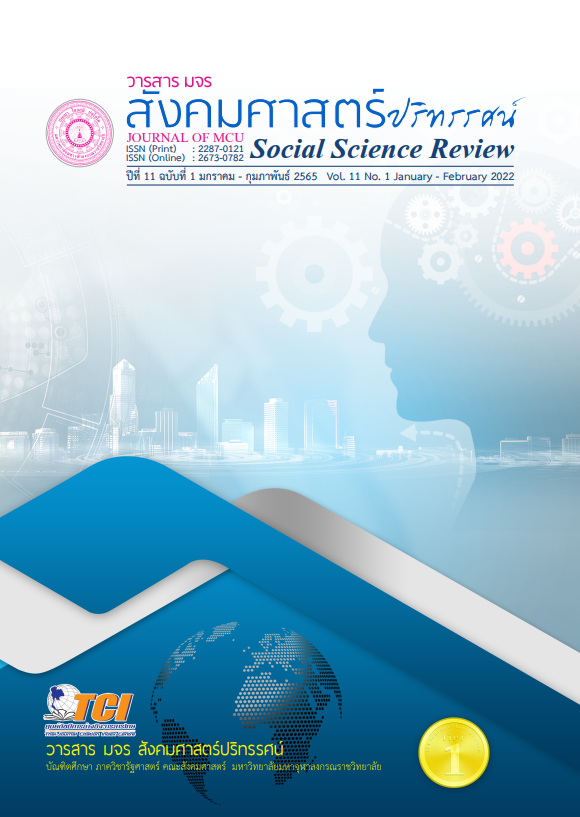ยุทธศาสตร์การพัฒนาเขตเศรษฐกิจพิเศษจังหวัดสระแก้ว ภายใต้บริบทประชาคมเศรษฐกิจอาเซียน
คำสำคัญ:
การพัฒนาเขตเศรษฐกิจพิเศษ, จังหวัดสระแก้ว, ประชาคมเศรษฐกิจอาเซียนบทคัดย่อ
บทความวิจัยนี้มีวัตถุประสงค์เพื่อ 1. ศึกษาบริบทการพัฒนาเขตเศรษฐกิจพิเศษ 2. วิเคราะห์จุดแข็ง จุดอ่อน อุปสรรค และโอกาส ในการพัฒนาเขตเศรษฐกิจพิเศษ 3. นำเสนอยุทธศาสตร์การพัฒนาเขตเศรษฐกิจพิเศษ ใช้วิธีวิจัยเชิงคุณภาพ ศึกษาเอกสาร สัมภาษณ์เจาะลึกกับผู้ให้ข้อมูลสำคัญ จำนวน 20 คน และจัดกลุ่มสนทนา เป็นจำนวน 10 คน ซึ่งเป็นตัวแทนของหน่วยงานและบุคคลในพื้นที่ ใช้การวิเคราะห์เชิงเนื้อหาการจำแนกชนิดข้อมูล และตรวจสอบข้อมูลแบบสามเส้า
ผลการวิจัยพบว่า 1. บริบทด้านการพัฒนาเขตเศรษฐกิจพิเศษ เป็นแนวคิดที่มาจากการนิคมอุตสาหกรรมแห่งประเทศไทย ได้ถูกพัฒนาขึ้นมาภายใต้กฎหมายและการบริหารจัดการที่มีลักษณะเฉพาะ การออกกฎหมายที่ค่อนข้างเสรี และการให้สิทธิพิเศษต่าง ๆ แก่ผู้ที่อาศัยอยู่ภายในเขตเศรษฐกิจพิเศษ 2. การวิเคราะห์ จุดแข็ง คือ ทำเลที่ตั้งของจังหวัดสระแก้วมีสภาพทางภูมิศาสตร์ที่เหมาะสมเป็นศูนย์กลางการคมนาคมขนส่งที่เชื่อมโยงระบบโลจิสติกส์ทั้งโครงข่ายถนน โครงข่ายระบบราง และโครงข่ายทางอากาศ จุดอ่อน คือ ภาพรวมในการส่งเสริมการลงทุนยังไม่ชัดเจน ขาดความพร้อมของหน่วยงานในท้องถิ่น อุปสรรค คือ มีข้อบังคับกฎหมายหลายฉบับจากหลากหลายหน่วยงานในเขตเศรษฐกิจพิเศษ และมีข้อจำกัด ส่วนโอกาส คือ การขยายตัวทางด้านการค้าการลงทุนมีแนวโน้มเพิ่มขึ้น 3. ยุทธศาสตร์การพัฒนาเขตเศรษฐกิจพิเศษ ประกอบไปด้วย 1) แผนการปฏิบัติการเขตเศรษฐกิจพิเศษ 2) ลักษณะของเขตเศรษฐกิจพิเศษ และ 3) ปัจจัยด้านบริบท
เอกสารอ้างอิง
เชียรช่วง กัลยาณมิตร และคณะ. (2558). เขตพัฒนาเศรษฐกิจพิเศษจังหวัดหนองคาย. เอกสารประกอบการสัมมนา โครงการประชุมสัมมนากำหนดกรอบการทำงานในการจัดตั้งเขตเศรษฐกิจพิเศษตามนโยบายของรัฐบาล ประจำปีงบประมาณ 2558. หนองคาย: สำนักงานจังหวัดหนองคาย.
ปริพัฒน์ ผลาสินธุ. (2561). ภาพรวมการพัฒนาและจัดตั้งเขตเศรษฐกิจพิเศษของไทยและกฎหมายที่เกี่ยวข้อง. กรุงเทพฯ: สถาบันวิชาการป้องกันประเทศ วิทยาลัยป้องกันราชอาณาจักร.
พรพิมล ปลั่งศรีสกุล และคณะ. (2560). การนำนโยบายด้านแรงงานไปปฏิบัติในการเข้าสู่ประชาคมเศรษฐกิจอาเซียนของประเทศไทย. วารสารการบริหารปกครอง, 6(2), 284-304.
วิชยานนท์ สุทธโส. (2560). ยุทธศาสตร์การพัฒนาเขตการค้าชายแดนไทย-กัมพูชา เพื่อการก้าวสู่ประชาคมอาเซียน กรณีศึกษาเขตการค้าชายแดน อำเภออรัญประเทศ จังหวัดสระแก้ว. วารสารวิชาการ มหาวิทยาลัยราชภัฏพระนคร, 8(2), 152-160.
ศุภวุฒิ สายเชื้อ. (2553). หนี้คือรากฐานของวิกฤติเศรษฐกิจ (พิมพครั้งที่ 2). กรุงเทพฯ: สำนักพิมพ์แห่งจุฬาลงกรณ์มหาวิทยาลัย.
ศิริวรรณ มนอัตระผดุง. (2557). การจัดตั้งเขตพัฒนาเศรษฐกิจพิเศษเพื่อรองรับการเข้าสู่ ประชาคม อาเซียน (Special Economic Zones to Support ASEAN Economic Community). กรุงเทพฯ: สำนักวิชาการ สำนักงานเลขาธิการวุฒิสภา.
สนธิรัตน์ สนธิจิรวงศ์. (2561). การพัฒนาเขตเศรษฐกิจพิเศษร่วมข้ามพรมแดน (Cross Border Economic Zone) เพื่อการค้า. กรุงเทพฯ: กระทรวงพาณิชย์.
สมศักดิ์ ศรีสันติสุข. และคณะ. (2560). เงื่อนไขการสร้างเครือข่ายความร่วมมือระหว่างผู้ประกอบการธรุกิจ (SMEs) และภาคส่วนอื่น ๆ เพื่อรองรับการเป็นเขตเศรษฐกิจพิเศษหนองคาย. วารสารการบริหารปกครอง, 6(1), 45.
สำนักงานคณะกรรมการพัฒนาการเศรษฐกิจและสังคมแห่งชาติ. (2559). แผนพัฒนาเศรษฐกิจและสังคมแห่งชาติ ฉบับที่ 12. กรุงเทพฯ: สำนักงานคณะกรรมการพัฒนาการเศรษฐกิจและสังคมแห่งชาติ.
สายฝน แหล่งหล่า. (2561). การพัฒนาเศรษฐกิจการค้าชายแดนไทย - กัมพูชา จังหวัดสระแก้ว. สระแก้ว: สำนักงานพาณิชย์จังหวัดสระแก้ว.
Aggarwal, A. (2020). Study on Collaborative Approach to Special Economic Zones (SEZs) Development and Cooperation in IMT-GT (TA 9572). Retrieved January 20, 2021, from: http://cmgfeng.psu.ac.th/images/ Document/Draf/SEZ.pdf
Brussevich, M. (2020). The Socio-Economic Impact of Special Economic Zones: Evidence from Cambodia. IMF Working Papers. Cambodia: Council for the Development of Cambodia.
ดาวน์โหลด
เผยแพร่แล้ว
รูปแบบการอ้างอิง
ฉบับ
ประเภทบทความ
สัญญาอนุญาต
ลิขสิทธิ์ (c) 2022 วารสาร มจร สังคมศาสตร์ปริทรรศน์

อนุญาตภายใต้เงื่อนไข Creative Commons Attribution-NonCommercial-NoDerivatives 4.0 International License.
เพื่อให้เป็นไปตามกฎหมายลิขสิทธิ์ ผู้นิพนธ์ทุกท่านต้องลงลายมือชื่อในแบบฟอร์มใบมอบลิขสิทธิ์บทความให้แก่วารสารฯ พร้อมกับบทความต้นฉบับที่ได้แก้ไขครั้งสุดท้าย นอกจากนี้ ผู้นิพนธ์ทุกท่านต้องยืนยันว่าบทความต้นฉบับที่ส่งมาตีพิมพ์นั้น ได้ส่งมาตีพิมพ์เฉพาะในวารสาร มจร สังคมศาสตร์ปริทรรศน์ เพียงแห่งเดียวเท่านั้น หากมีการใช้ภาพหรือตารางหรือเนื้อหาอื่นๆ ของผู้นิพนธ์อื่นที่ปรากฏในสิ่งตีพิมพ์อื่นมาแล้ว ผู้นิพนธ์ต้องขออนุญาตเจ้าของลิขสิทธิ์ก่อน พร้อมทั้งแสดงหนังสือที่ได้รับการยินยอมต่อบรรณาธิการ ก่อนที่บทความจะได้รับการตีพิมพ์ หากไม่เป็นไปตามข้อกำหนดเบื้องต้น ทางวารสารจะถอดบทความของท่านออกโดยไม่มีข้อยกเว้นใดๆ ทั้งสิ้น





